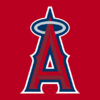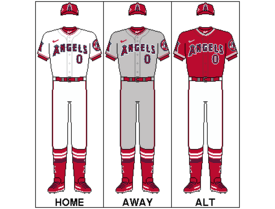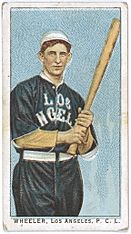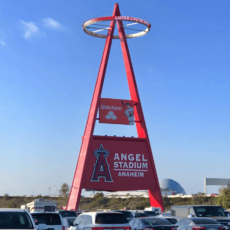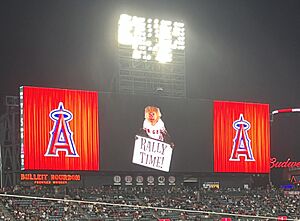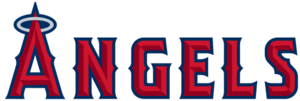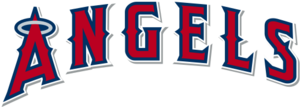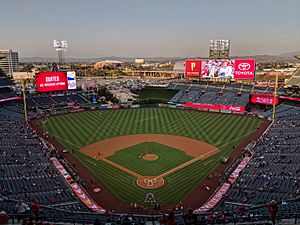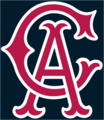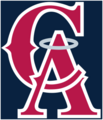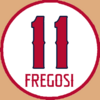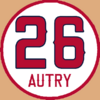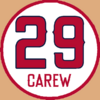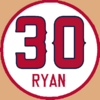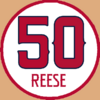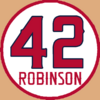Los Angeles Angels facts for kids
Quick facts for kids Los Angeles Angels |
|||||
|---|---|---|---|---|---|
|
|||||
|
|||||
| Major league affiliations | |||||
|
|||||
| Current uniform | |||||
| Retired numbers | |||||
| Colors | |||||
|
|||||
| Name | |||||
|
|||||
| Other nicknames | |||||
|
|||||
| Ballpark | |||||
|
|||||
| Major league titles | |||||
| World Series titles (1) | 2002 | ||||
| AL Pennants (1) | 2002 | ||||
| AL West Division titles (9) |
|
||||
| Wild card berths (1) | 2002 | ||||
| Front office | |||||
| Principal owner(s) | Arte Moreno | ||||
| President | John Carpino | ||||
| General manager | Perry Minasian | ||||
| Manager | Ron Washington | ||||
The Los Angeles Angels are a professional baseball team from the Greater Los Angeles area. They play in Major League Baseball (MLB) as part of the American League (AL) West Division. Since 1966, their home games have been at Angel Stadium in Anaheim, California.
The team started in Los Angeles in 1961. It was founded by Gene Autry as one of MLB's first two expansion teams. This means they were a new team added to the league. The Angels were the first MLB team to start in California. Their name comes from an older baseball team called the Los Angeles Angels that played in the Pacific Coast League (PCL).
The team stayed in Los Angeles until 1966, when they moved to Anaheim. Because of this move, they were called the California Angels from 1965 to 1996. Then, from 1997 to 2004, they were known as the Anaheim Angels. In 2005, "Los Angeles" was added back to their name. However, a deal with Anaheim meant the city's name also had to be included. So, they were called the Los Angeles Angels of Anaheim until 2015. The team has been known as the Los Angeles Angels since the 2016 season.
For their first 40 years, the Angels were an average team. But they did win three division titles. Famous players like Nolan Ryan, Rod Carew, and Reggie Jackson played for them. In 2002, under manager Mike Scioscia, they earned their first Wild Card spot. This led them to win the 2002 World Series, which is their only championship so far. They are one of only two MLB teams to win their only World Series appearance.
Over the next seven years, the Angels won five more division titles. Star players like Vladimir Guerrero helped lead the team. More fans started coming to their games, making them one of the most popular teams in MLB. Since 2012, their popularity has grown even more. This is thanks to players like Albert Pujols, Mike Trout, and Shohei Ohtani. These three players won five AL Most Valuable Player (MVP) awards while with the team. Even with these stars, the Angels have not reached the playoffs since 2014. This is the longest playoff drought for any MLB team right now.
As of 2024, the Angels have won 5,021 games and lost 5,115 games. They were the first expansion team to reach 5,000 total wins.
Contents
Team History
The name Los Angeles Angels comes from the city's first sports team. This team was the Los Angeles Angels of the California League. They took their name from the Spanish words "Los Angeles," which means 'The Angels'. This team name started in 1892. In 1903, the name continued with the Los Angeles Angels of the Pacific Coast League.
The current Angels team was started by MLB in 1961. The original owner, Gene Autry, bought the rights to the team name. He bought it from Walter O'Malley, who owned the Los Angeles Dodgers. Autry wanted to continue the history of the popular Pacific Coast League team. Some players from the old PCL Angels even joined the new MLB Angels in 1961.
As a new team, the Angels played their home games at Wrigley Field in Los Angeles. This was the same stadium where the PCL Angels used to play. The Angels were one of two new teams added to MLB in 1961. The other was the Washington Senators (now the Texas Rangers). In 1962, the Angels moved to the new Dodger Stadium. They played there as tenants of the Dodgers until 1965.
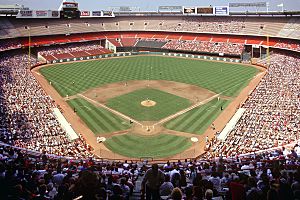
Team founder Gene Autry owned the Angels for 36 years. During his time, the team made it to the playoffs three times. However, they never won the league championship. The team changed its name several times. On September 2, 1965, they became the California Angels. This was because they were moving to the new Anaheim Stadium in Anaheim for the 1966 season.
The Walt Disney Company took over the team in 1997. They planned to start a new TV channel called "ESPN West." Disney renovated Anaheim Stadium, which was then renamed Edison International Field of Anaheim. The city of Anaheim helped pay for the renovations. As part of the deal, the stadium and team names had to include "Anaheim." So, the team was renamed the Anaheim Angels. In 1998, the ESPN West plan did not happen. On September 26, 2002, the Angels reached the playoffs for the first time in 16 years. With only one All-Star player, Garret Anderson, and led by manager Mike Scioscia, the Angels won their first league championship and the 2002 World Series in 2002.
In 2005, new owner Arte Moreno added Los Angeles to the team's name. To follow their lease with Anaheim, the team was officially called the Los Angeles Angels of Anaheim. Fans and cities did not like this change. The city of Anaheim even sued, but the name change was upheld in court. The lawsuit ended in 2009. The team often calls itself the Angels or Angels Baseball in its home area. The name Los Angeles does not appear on their uniforms or at the stadium. However, their uniforms have always said "Angels" instead of the city or state name. News services like the Associated Press usually call them the Los Angeles Angels or the Angels.
In 2013, the team planned to drop "of Anaheim" and go back to Los Angeles Angels. This was part of a new stadium lease deal. The deal was not finalized, but by 2020, most official sources stopped using "of Anaheim."
In 2019, the city of Anaheim voted to sell Angel Stadium and the land around it to a group led by owner Arte Moreno. This deal would have included a new or improved stadium and many new buildings. However, the deal was later canceled due to issues with the stadium agreement. In 2023, the Angels scored a team record 25 runs in one game against the Rockies. They scored 13 runs in just one inning!
Team Culture
The phrase "Win One for the Cowboy" is a special saying for Angels fans. It refers to the team's founder, Gene Autry, who was also a famous singing cowboy. He owned the team for 38 years but never saw them win a World Series. He passed away four years before the Angels won their first World Series in 2002. After winning, Angels player Tim Salmon brought out one of Autry's white cowboy hats to honor him. Autry's jersey number, 26, was retired to show he was like the "26th man" on the field.
Angel Stadium of Anaheim is often called "The Big A." It has a special area in center field called the "California Spectacular." This area has artificial rocks that look like a desert mountain. It has a waterfall and shoots fireworks before every game. Fireworks also shoot from the rocks when the Angels hit a home run or win a home game.
Each game starts with the song "Calling All Angels" by Train. A video showing great moments in team history plays with the song.
Since 2024, the Angels' home run song has been "Dance With Me" by Blink-182. They have used other songs in the past, like "Song 2" by Blur and "Chelsea Dagger" by The Fratellis.
After an Angels home win, fans often say "Light That Baby Up!" This refers to the tall "A" sign with a halo at Angel Stadium. The halo lights up every time the Angels win at home. Other sayings include "Just another Halo victory!" and "And the Halo shines tonight!"
The Angels were the first team in North America to use thundersticks.
The Rally Monkey
The Rally Monkey is a fun mascot for the Angels. It appears on the scoreboard when the Angels are losing or the game is tied, usually from the 7th inning on. The Rally Monkey shows up in funny video clips from movies, edited to include the monkey.
The Rally Monkey started in 2000. A clip from a movie was shown on the scoreboard, and the Angels came back to win. Fans loved it so much that the team hired a real monkey named Katie. She starred in new video clips for games. When she appears, she jumps up and down to the song "Jump Around" and holds a sign that says "RALLY TIME!"
The Rally Monkey became famous during the 2002 World Series. The Angels were playing the San Francisco Giants. In Game 6, the Angels were losing 5-0 in the 7th inning and faced elimination. With the Rally Monkey cheering them on, the Angels scored six runs and won the game! This helped them win the championship in Game 7. The Rally Monkey's popularity grew even more when the Angels made the playoffs five times between 2004 and 2009.
Team Popularity
The Angels have drawn many fans to their stadium. From 2003 to 2019, over 3 million fans came each year. Since 2002, at least 2 million fans have attended annually. In 2019, the Angels were fifth in MLB for attendance, with over 3 million people.
Angels fans have even set several Guinness World Records. These include the largest gatherings of people wearing blankets, wrestling masks, cowboy hats, wigs, Santa hats, superhero capes, and sombreros. They also set a record for the largest gathering of people with selfie sticks.
In 2009, ESPN magazine named the Angels the number one professional sports team for "Fan Value." In 2012, ESPN and fan polls ranked the Angels fifteenth among all sports teams and third best among MLB teams. These rankings looked at things like fan attendance, how the team treats fans, winning percentage, ownership, and stadium experience.
Logos and Colors
The Los Angeles Angels have used ten different logos and three main color combinations. Their first two logos showed a baseball with wings and a halo, with the letters "L" and "A" on it. The original team colors were mostly blue with red trim. This color scheme lasted from 1961 to 1996.
On September 2, 1965, the team changed its name to the "California Angels." This was before their move to Anaheim in 1966. The logo changed too. The first logo under this name was similar to the "LA" logo, but with an interlocking "CA." From 1971 to 1985, the logo had the word "Angels" written over an outline of California.
In 1965, the stadium got its nickname, "the Big A." This came from the tall letter "A" with a halo that used to be part of the scoreboard.
In 1986, the Angels used the "big A" on top of a baseball as their new logo, with a shadow of California behind it. After 1992, the Angels went back to their interlocking "CA" logo. This logo was used from 1993 to 1996.
After the stadium was renovated and Disney took over, the Angels changed their name to the "Anaheim Angels." They also changed their logo and colors. The first Disney logo had a cartoon-like "ANGELS" script with a wing on the "A." The colors changed to dark blue and light blue. After 2001, Disney changed the logo back to a "Big A" with a silver halo over a dark blue baseball diamond. With this change, the team's colors became mostly red, with some dark blue and white. These are their current colors.
When the team's name changed to the "Los Angeles Angels of Anaheim," the logo changed only a little. The words "ANAHEIM ANGELS" and the blue baseball diamond were removed, leaving just the "Big A."
For the 2011 season, which was the Angels' 50th anniversary, the halo on the 'Big A' logo temporarily changed from silver to gold. This honored past Angels logos and the tradition of gold for 50th anniversaries. The uniforms also had the gold halo that season.
During the 50th Anniversary season, players wore throwback jerseys on Friday home games. These jerseys showed all the different logos and uniforms from the past. Also, former Angels players threw the first pitch at every home game that season.
A new patch was added to the uniforms before the 2012 season. It was a red circle with "Angels Baseball" and the team logo inside. It also showed the year 1961, when the team started. With this new patch, the Angels' "A" with the halo appeared in three places on the jersey.
Team Rivalries
The Angels have rivalries with other teams in their division, the AL West. These include the Oakland Athletics, Seattle Mariners, Texas Rangers, and Houston Astros. They also see the New York Yankees and Boston Red Sox as rivals. This is because they played against them in the playoffs seven times in the 2000s. The Los Angeles Dodgers are also a local rival. Their games are called the Freeway Series because of the freeways connecting their stadiums.
Angels vs. Athletics
The Angels and Athletics have been rivals since the A's moved to California in 1968. Both teams have often competed for the division title. The rivalry was strongest in the early 2000s when both teams were very good. In 2002, the A's won 20 games in a row, but the Angels still made the playoffs as a Wild Card team. The Angels then went on to win the World Series that year. In 2004, the Angels beat the A's in the final week of the season to win the division. The Athletics have won more games in the series overall.
Angels vs. Texas Rangers
The rivalry between the Angels and Texas Rangers grew because both teams have often been strong in their division. Also, several players have played for both teams, like Nolan Ryan and Vladimir Guerrero. There have been some heated moments between the teams, including fights between players.
The Angels and Rangers are the only two MLB teams to have each pitched a perfect game against the other. Mike Witt pitched a perfect game for the Angels against the Rangers in 1984. Kenny Rogers pitched one for the Rangers against the Angels in 1994.
Angels vs. Los Angeles Dodgers
The rivalry with the Los Angeles Dodgers is called the Freeway Series. This is because the two teams' stadiums are linked by freeways, mainly Interstate 5. It is one of four MLB rivalries between teams in the same big city area.
From 1962 to 1965, the Angels played their home games at Dodger Stadium. The Dodgers owner, Walter O'Malley, allowed the Angels to play there. On May 5, 1962, Angels pitcher Bo Belinsky threw the first no-hitter in Dodger Stadium history.
When interleague play started in 1997, the Angels and Dodgers played each other in regular season games for the first time. In 1999, a fight broke out between the two teams. Angels pitcher Tim Belcher and Dodgers pitcher Chan Ho Park got into an argument that led to punches.
On December 9, 2023, Angels star player Shohei Ohtani signed with the Dodgers. This was the largest contract in professional sports history.
Radio and Television
The main radio station for the Angels is KLAA 830 AM. The team owns this station. Terry Smith has been the play-by-play announcer since 2002, and Mark Langston has been the color commentator since 2012. Before KLAA, most Angels games were on KSPN (710 AM) from 1961 to 1996. Spanish-language Angels games are on KWKW (1330 AM).
Angels games are shown on the cable channel FanDuel Sports Network West (FDSNW). Wayne Randazzo is the play-by-play announcer, and Mark Gubicza is the color commentator. Sometimes, other announcers fill in. If there are scheduling conflicts with the Los Angeles Kings hockey team, Angels games might be shown on other channels.
The Angels have been with this network since 1993. The network has changed names many times. Over-the-air station KTLA showed Angels games from 1964 to 1995. KCAL-TV also showed Angels games from 1961 to 1963 and again from 1996 to 2005. Dick Enberg was a famous Angels play-by-play announcer. He was known for saying "And the halo shines tonight" after Angels wins. Former announcer Victor Rojas (2010–2020) would say "Light that baby up" after wins.
Awards and Honors
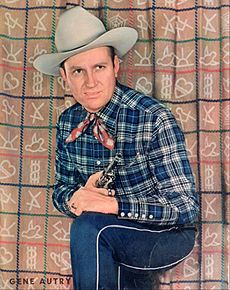
Retired Numbers
|
- Number 26 was retired for Gene Autry. It means he was the team's "26th Man." (At the time, teams usually had 25 players on their active roster.)
- Number 42 was retired across all of Major League Baseball in 1997 to honor Jackie Robinson.
Numbers Not Used, But Not Retired
- Number 1 has not been used since Bengie Molina retired.
- Number 34 was not used after Nick Adenhart passed away in 2009, until Noah Syndergaard wore it in 2022.
- Number 45 has not been used since Tyler Skaggs passed away in 2019.
Angels Hall of Fame
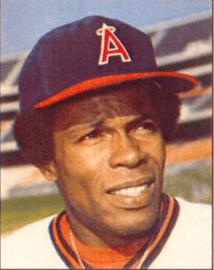
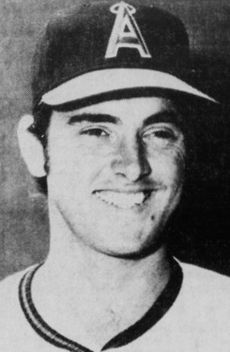
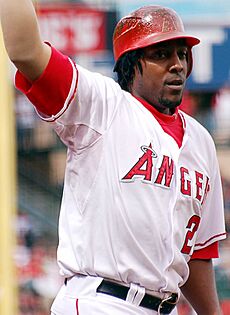
The Angels started their own Hall of Fame in 1988. They have inducted 15 people, including players and one executive. The entire 2002 World Series team was also inducted.
| Year | Year inducted |
|---|---|
| Bold | Member of the Baseball Hall of Fame |
|
|
Member of the Baseball Hall of Fame as an Angel |
| Angels Hall of Fame | ||||
| Year | No. | Name | Position(s) | Tenure |
|---|---|---|---|---|
| 1988 | 4 | Bobby Grich | 2B | 1977–1986 |
| 1989 | 11 | Jim Fregosi | SS Manager |
1961–1971 1978–1981 |
| 1990 | 12, 25 | Don Baylor | DH/LF | 1977–1982 |
| 1991 | 29 | Rod Carew | 1B Coach |
1979–1985 1992–1999 |
| 1992 | 30 | Nolan Ryan | P | 1972–1979 |
| 1995 | 50 | Jimmie Reese | Coach | 1972–1994 |
| 2009 | 5, 9 | Brian Downing | DH/LF/C | 1978–1990 |
| 31 | Chuck Finley | P | 1986–1999 | |
| 2011 | 26 | Gene Autry | Owner/Founder | 1961–1998 |
| 2012 | 2002 World Series Team | |||
| 2013 | 29 | Bobby Knoop | 2B Coach |
1964–1969 1979–1996, 2013–2018 |
| 2015 | 31 | Dean Chance | P | 1961–1966 |
| 15 | Tim Salmon | RF | 1992–2006 | |
| 39 | Mike Witt | P | 1981–1990 | |
| 2016 | 16 | Garret Anderson | LF | 1994–2008 |
| 2017 | 27 | Vladimir Guerrero |
RF/DH | 2004–2009 |
Team Captains
- Jerry Remy, 1977
- Don Baylor, 1978–1982
Baseball Hall of Fame Members
Several famous players who are in the Baseball Hall of Fame played for the Angels. The Hall of Fame lists Nolan Ryan as primarily an Angel. Also, Vladimir Guerrero was inducted into the Hall of Fame in 2018 wearing an Angels cap.
| Los Angeles Angels Hall of Famers | |||||||||||||||||||||||||||
|---|---|---|---|---|---|---|---|---|---|---|---|---|---|---|---|---|---|---|---|---|---|---|---|---|---|---|---|
| Affiliation according to the National Baseball Hall of Fame and Museum | |||||||||||||||||||||||||||
|
Ford C. Frick Award Winners
| Los Angeles Angels Ford C. Frick Award recipients | |||||||||
|---|---|---|---|---|---|---|---|---|---|
| Affiliation according to the National Baseball Hall of Fame and Museum | |||||||||
|
Team Roster
|
Los Angeles Angels 2023 spring training roster
|
||||||
|---|---|---|---|---|---|---|
| 40-man roster | Non-roster invitees | Coaches/Other | ||||
|
Pitchers
|
Catchers
Infielders
Outfielders
|
|
Manager
Coaches
40 active, 0 inactive, 0 non-roster invitees
|
|||
Minor League Teams
The Los Angeles Angels have six minor league teams. These teams help develop new players for the main Angels team.
| Class | Team | League | Location | Ballpark | Affiliated |
|---|---|---|---|---|---|
| Triple-A | Salt Lake Bees | Pacific Coast League | South Jordan, Utah | Daybreak Field at America First Square | 2001 |
| Double-A | Rocket City Trash Pandas | Southern League | Madison, Alabama | Toyota Field | 2020 |
| High-A | Tri-City Dust Devils | Northwest League | Pasco, Washington | Gesa Stadium | 2021 |
| Single-A | Inland Empire 66ers | California League | San Bernardino, California | San Manuel Stadium | 2011 |
| Rookie | ACL Angels | Arizona Complex League | Tempe, Arizona | Tempe Diablo Stadium | 2001 |
| DSL Angels | Dominican Summer League | Boca Chica, Santo Domingo | Academia de Abel Garcia | 1999 |
More About the Angels
- List of Los Angeles Angels first-round draft picks
- List of Los Angeles Angels no-hitters
- List of Los Angeles Angels Opening Day starting pitchers
- List of Los Angeles Angels owners and executives
- List of Los Angeles Angels seasons
See also
 In Spanish: Los Angeles Angels para niños
In Spanish: Los Angeles Angels para niños
 | Shirley Ann Jackson |
 | Garett Morgan |
 | J. Ernest Wilkins Jr. |
 | Elijah McCoy |



